The next morning, on the way out of Leonora, I rode through Gwalia, another ghost town around an old gold mine. The State Hotel in particular is a magnificent building, standing alone.
Then I hit the open road, on the last stretch of bitumen I’d see for a while, to the town of Laverton. The red earth of the outback was already on display.
The start line has little fanfare, considering it’s over 1100 kilometres in length.
The road itself is generally in reasonable condition – very wide, with alternating hard-packed and loose gravel, and some areas of corrugation. Fairly easy to avoid on a bike though, picking a line through. Most of the time I could hold 100kph.
This was the Great Victoria Desert, and what amazed me was the amount of vegetation. Granted, there had been two heavy rainfalls in the last few weeks, which explained a lot of the bright green new-growth grasses, but a lot of the scrub and low trees had obviously been there a while.
The desert wildflowers were in full display, too, with scatters of vivid colour splashed across the red and green landscape. Sturt’s Desert Pea in particular was a beauty.
In general the road just kept sweeping over the long plains, allowing that meditative zen state.
Abandoned vehicles are everywhere – if it’s not possible to bodgy up a fix to get you to the next roadhouse, it’s generally not worth recovering. These cars then become easy targets for vandalism.
A rare water tank and pump. There were half a dozen wild brumbies drinking here, but they fled as I approached.
The camels along the way were more brave.
An interesting choice of flag on this pole.
The contrast in colours between the earth, sky and vegetation was a never-ending spectacle.
The first of several roadhouses was Tjukayirla. If paying $2 per litre for fuel across the Nullarbor was shocking, then the $2.40 here was outrageous – but justifiable, considering the remoteness.
Despite originally planning on camping at the roadhouse, I had plenty of daylight left so pressed on a while longer.
I pulled off the road at the top of a ridgeline and settled in for the sunset.
The next morning was a very early start, after an early night. Crossing into the next Shire, someone had finally erected a sign dedicated to the road!
I passed through areas that were more what I was expecting of the desert. At some point, I crossed from the Great Victoria Desert into the southern reaches of the Gibson Desert.
It seems the decision has been made to upgrade and pave this road – which is great for regular travellers and the inhabitents of the communities along it, but not so great for those of adventurous spirit looking for a challenge. At the moment it’s only around 40 km, but that will surely grow.
It was a little after here I discovered I’d cracked my exhaust. Obviously when I’ve done it up, there’s been some tension in the pipework, and the weld has finally failed with the corrugations and bumps in the road. Not much I could do at this point, and most of the gases were still going through the muffler, so it wasn’t too loud.
The other users of the road, although rare, were an annoyance due to the dust clouds they’d bring in their wake. Shut the visor, hold the breath, and blink rapidly!
More scenery.
There were even areas of proper woodland, which again I wasn’t expecting from the desert! Must be very hardy in long periods of drought.
Petrol sniffing is a big issue in the aboriginal communities, to the point that the authorities have mandated the sale of low aromatic petrol (doesn’t work for sniffing) throughout these areas. Signs like this are on the roads in to every settlement.
Approaching Warakurna, the landscape started to resemble the Flinders Ranges – large upthrust granite ranges with amazing patterns of colour and erosion. This was the Rawlinson Ranges.
This part of the road was part of the old Gunbarrel Highway. Len Beadell, the surveyor of many outback roads in the 50’s and 60’s, left a number of plaques such as this to mark his passage.
Finally, the state border.
The difference in road quality was immediately noticeable. Large leftover pools of water, deep rutting, and much rougher corrugations, made going slower and more difficult.
However the scenery, passing through the middle of the ranges, was spectacular.
Despite the pools of water, the colours of the vegetation were much more subdued.
River crossings in particular were tricky – they were hard to spot, and needed to be carefully negotiated in first gear. On several occasions I had to lock the rear just to slow down in time!
In the last 100km or so, during the rough corrugations, my exhaust failed completely and came flying off. What was an annoying but manageable amount of noise very quickly became a headache, even with earplugs in.
As the shadows lengthened, I finally came into sight of my goal – the Olgas, near Ayers Rock. They glow a magical, vivid red as the sun sets, and I was just in time for the show.
And once the sun’s rays are gone, they revert to a duller brown colour.
Walking back to the bike, I found out the exhaust wasn’t the only thing to fall off – the vibrations also claimed my number plate.
Once I’d had a feed and beer, I tackled some emergency repairs to the exhaust, so as not to go deaf, and made up some cardboard number plates. It ended up being a late night!





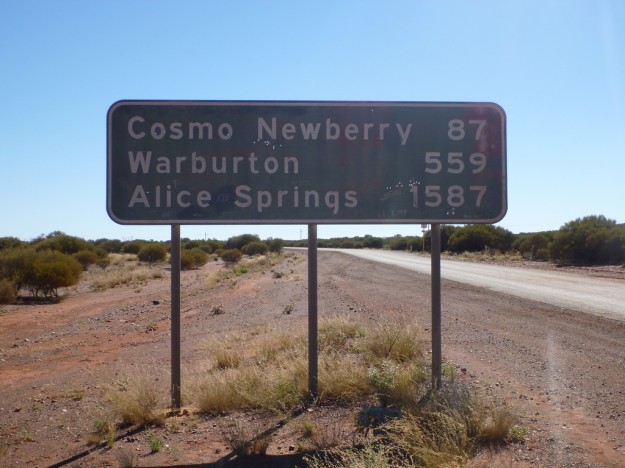


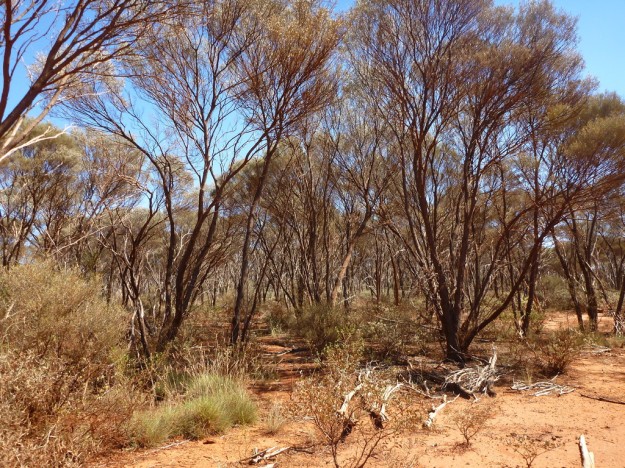


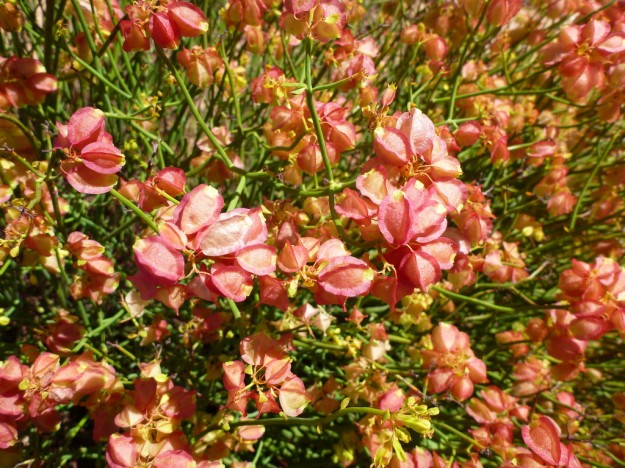

















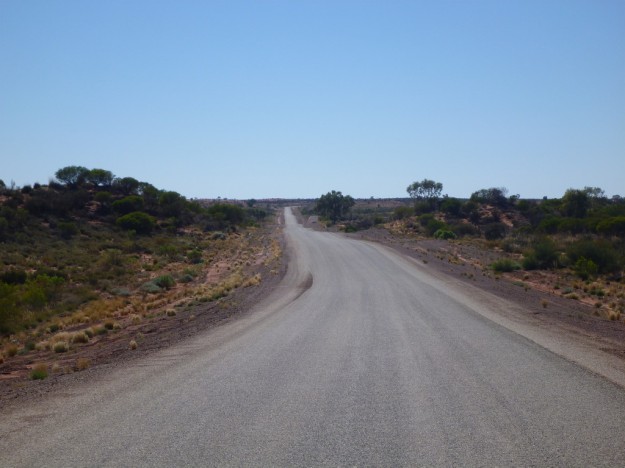



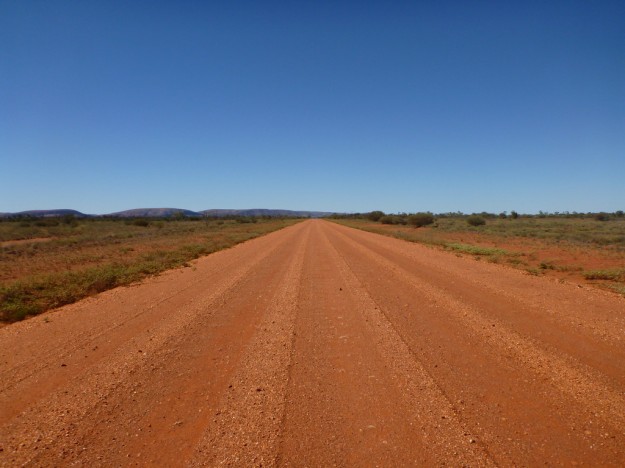


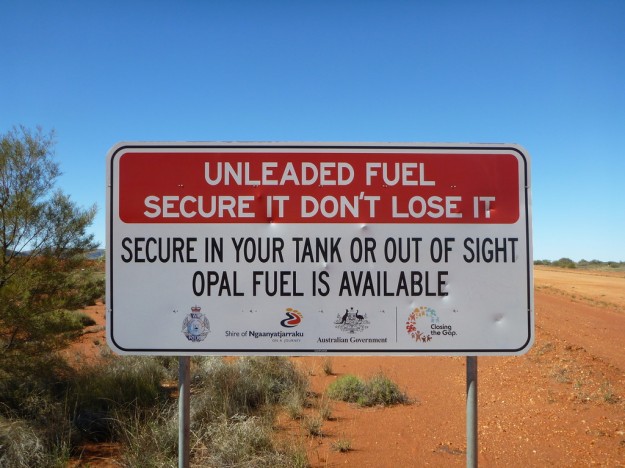

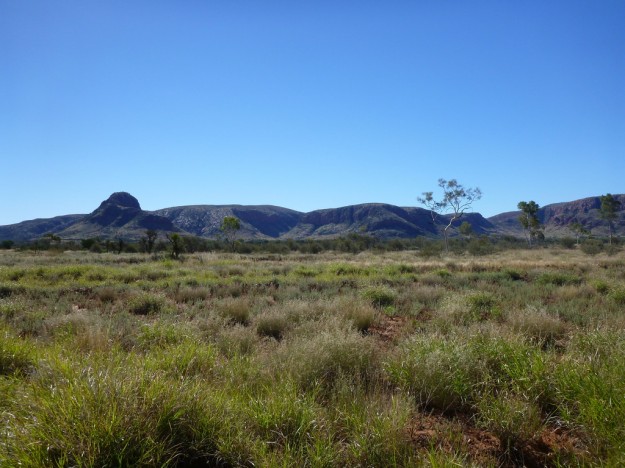








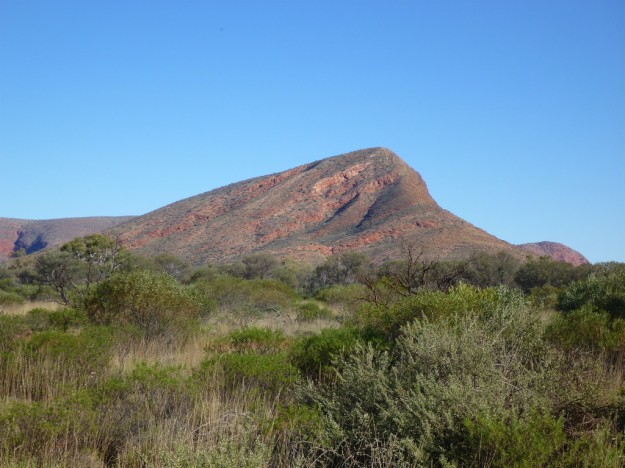



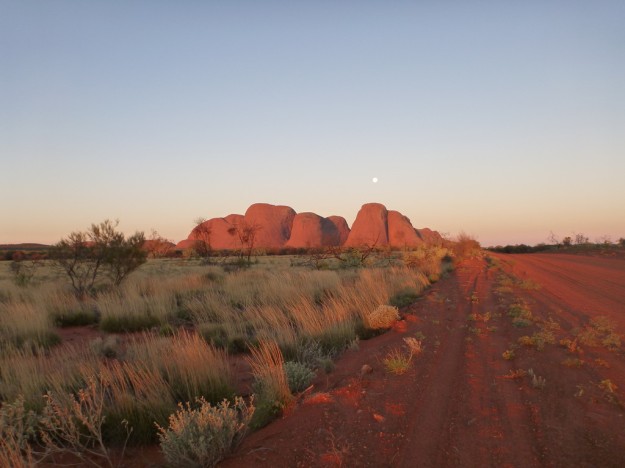



Still riding along with you friend, great stories and I’ll try that home made license plate next time my tabs are due to expire.
Pingback: Horizons Unlimited - The HUBB